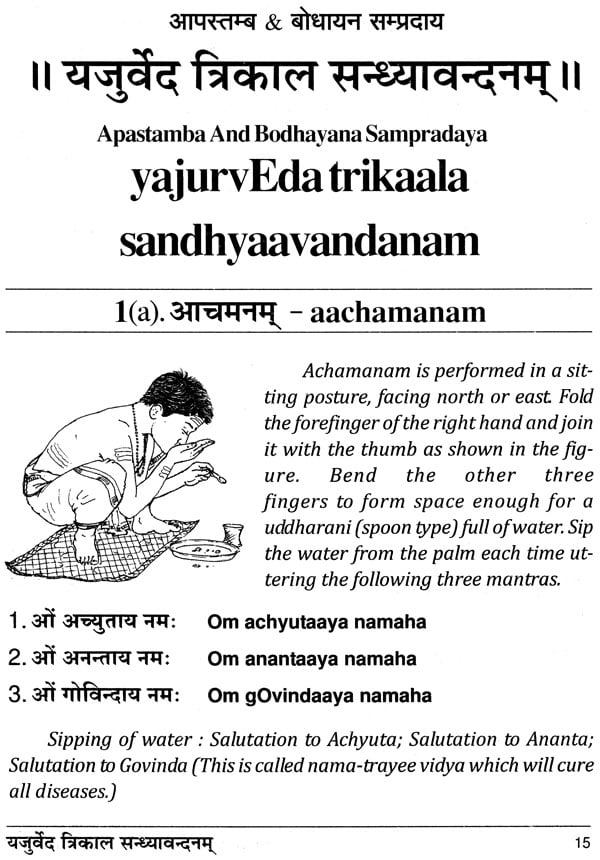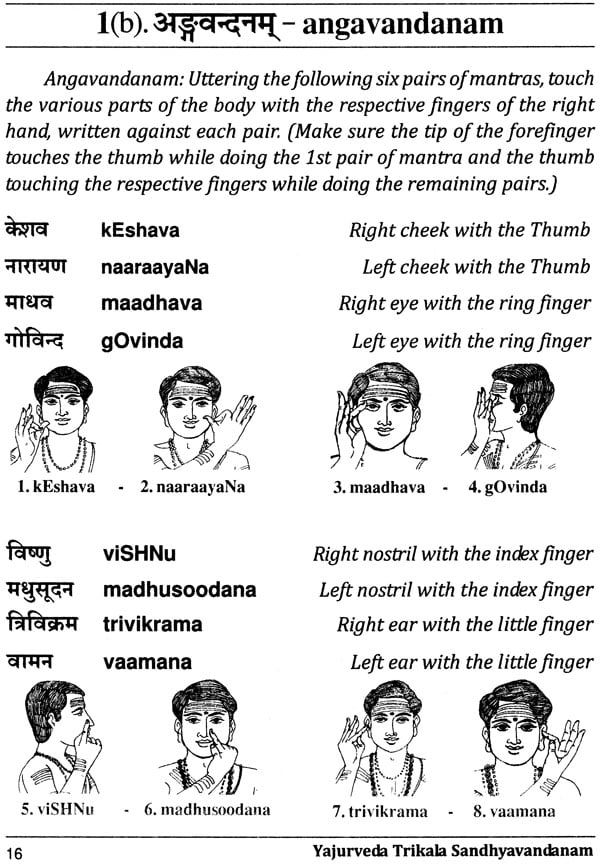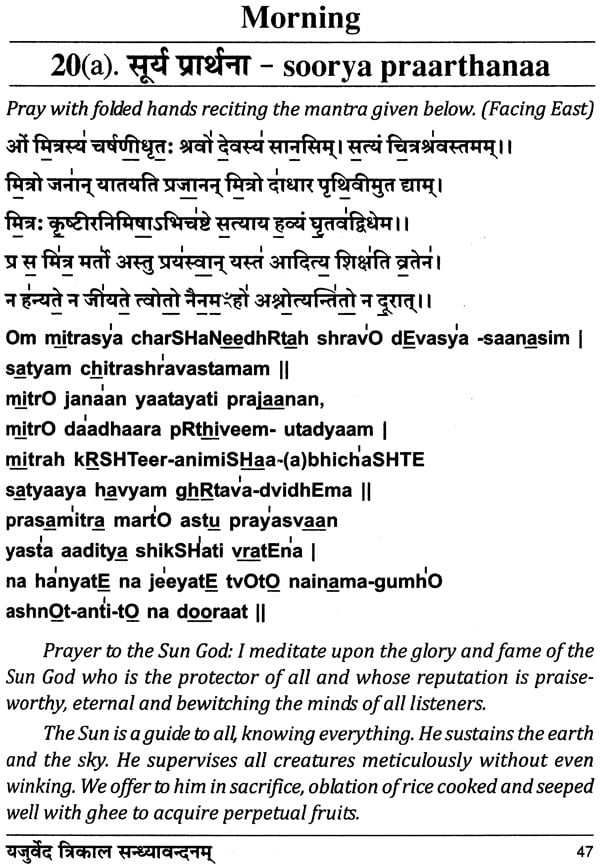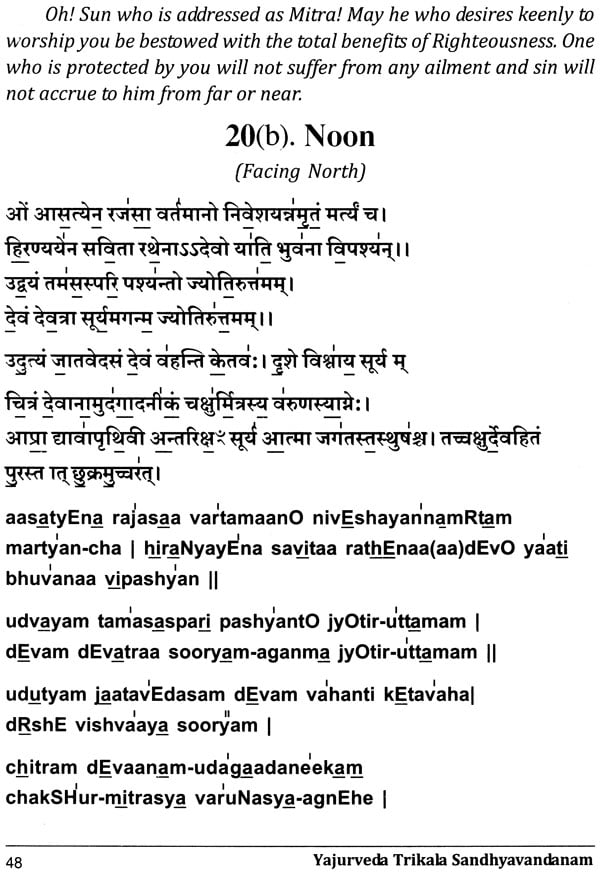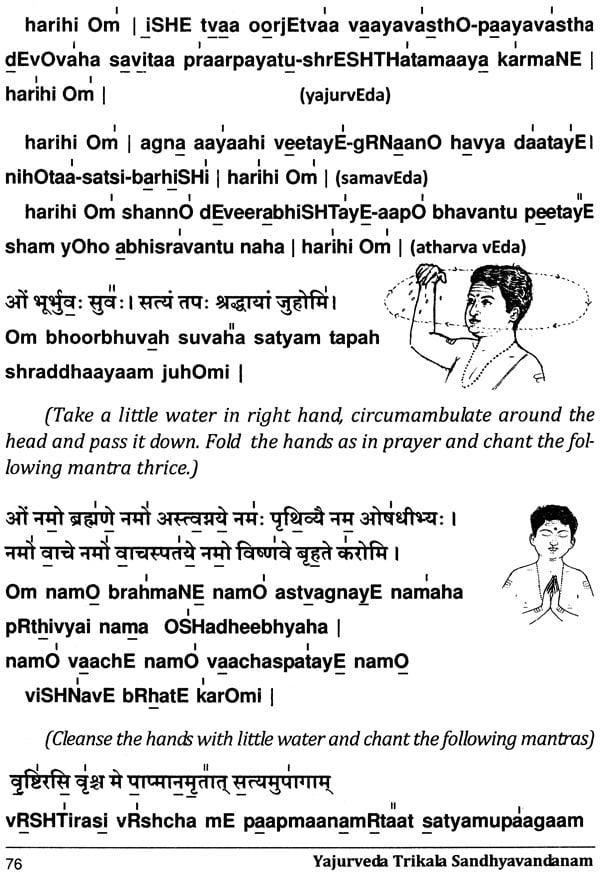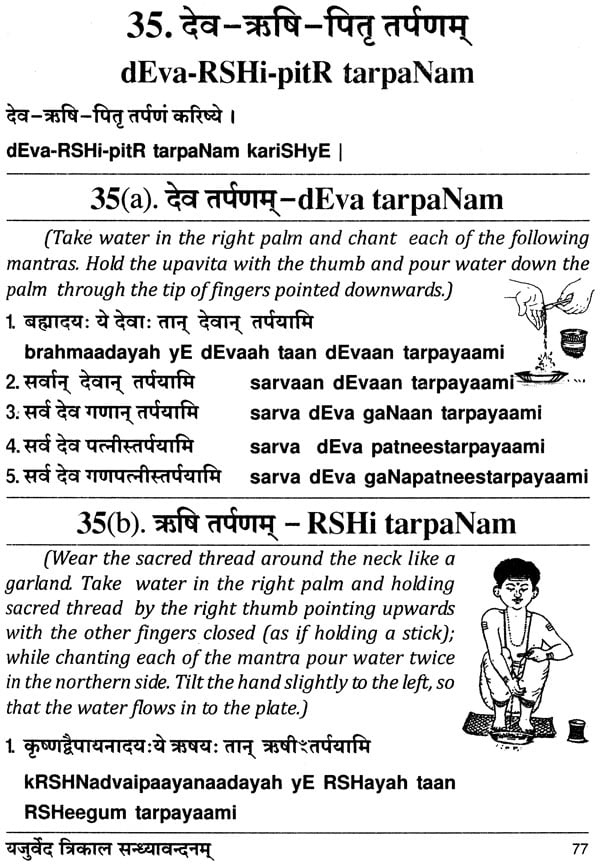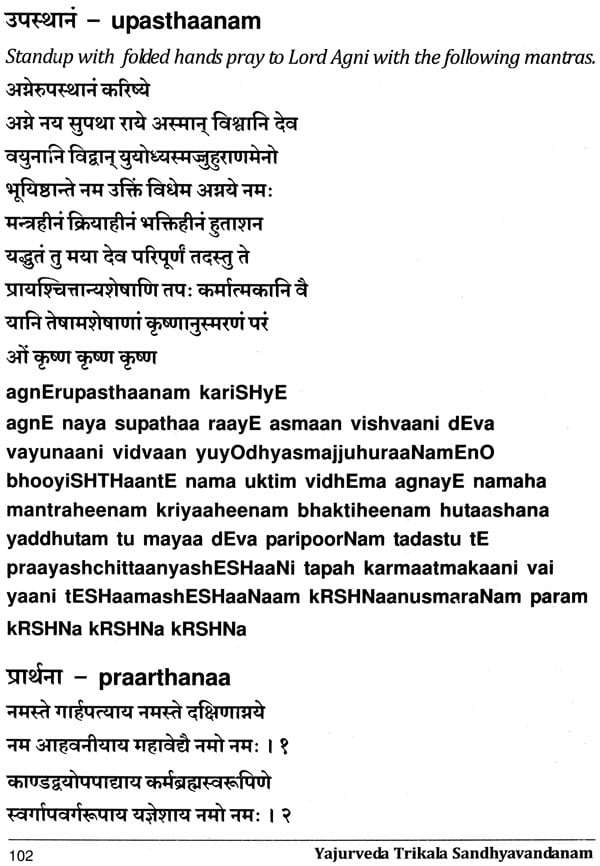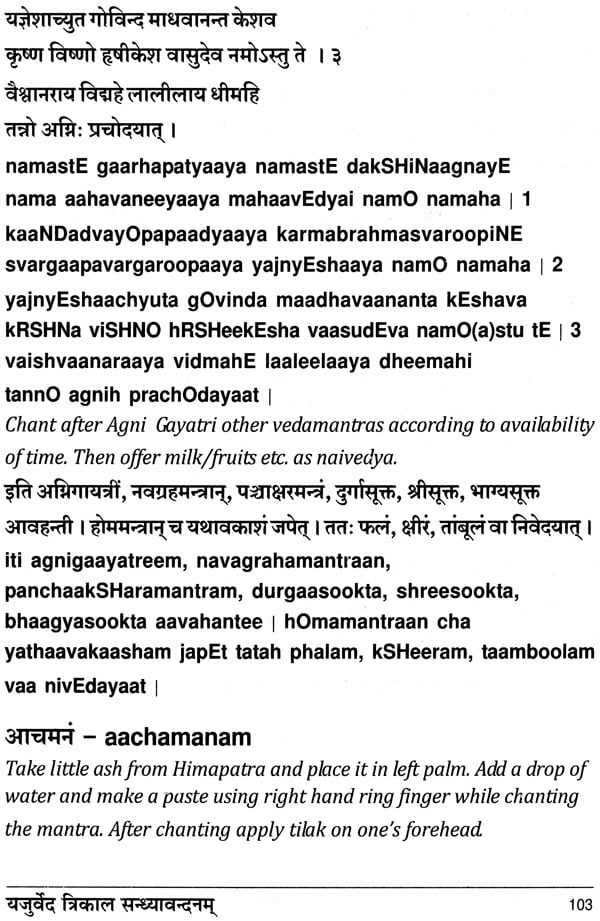
यजुर्वेद त्रिकाल सन्ध्यावन्दनम्: Yajurveda Trikala Sandhyavandanam (Made Easy with Instructions & Illustrations) (Sanskrit Text with Transliteration and English Translation)
Book Specification
| Item Code: | NAH219 |
| Author: | Shri A.R. Parthasarathi |
| Publisher: | Giri Trading Agency Pvt Ltd, Chennai |
| Language: | Sanskrit Text with Transliteration and English Translation |
| Edition: | 2022 |
| ISBN: | 9788179502921 |
| Pages: | 120 (23 B/W Illustrations) |
| Cover: | Paperback |
| Other Details | 9.5 inch X 7.5 inch |
| Weight | 210 gm |
Book Description
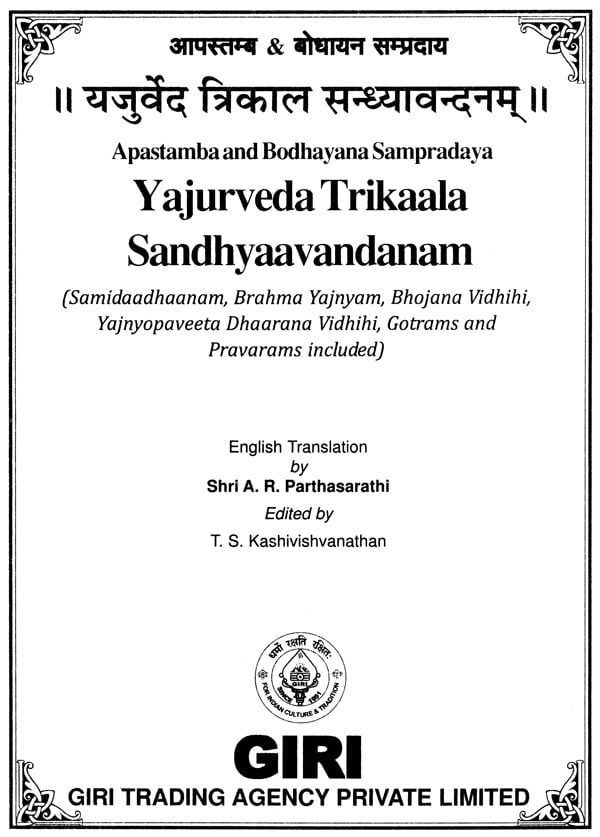
You the user of the book are to be thanked primarily. Without your need for this book and it use, this compilation wouldn’t have achieved its goal. So, THANK YOU!
Why am I thanking you right at the beginning? There are quite a few books on this subject already. That is indeed a reasonable observation. But the moment you being using it, the purpose would become clear.
However, I have to thank quite at the few people starting with my father Giri – the found of this institution and his absolute faith in Nitya Karma. As far as I remember – he always preformed the Sandhyavandanam – ever day, without fail.
Several decades ago, when the young Giri wanted to present a book on this scientific prayer system to a lad who was getting initiated into the Upanayanam, in the city of Bombay (now Mumbai), he couldn’t buy one due its unavailability.
Giri then created a small bookshop that would always stock this book – in as many language transliterations as possible. Thus Giri Trading Agency came into existence. Today the institution is seeing the third generation of the family handling what he lovingly created and is represented in three major spiritual centres of Indian – Mumbai, Chennai and Coimbatore.
Next I thank my brother Ramanarayanan and Srinivasan for constantly kindling my interest and urging me to complete it as early as possible. They came up with the best title possible. Mangala, my kid sister – now a woman entrepreneur in her own right besides being a legal professional should be thanked – for her great contribution.
Then I express my gratitude to Shri A.R. Parthasarathi for a simple and user friendly translation of the verses. I have observed that Parthasarathi Mama’s service is for the rarest type – and which is propelled by a selfless urge to help others. ‘Paropakaratham Idam Mahaangaha – an apt quote to describe him. Mama you are truly a saint.
Srimati Uma Shankar (Professor, SIES College, from Chedda Nagar, Chembur), for her scholarly assistance in correcting the texts, improving illustrations and a singularly vital explanation for the Gayatri Dhyanam.
But for her, this wonderful discovery would have had to wait for other works – which may have had to wait for other works – which may have missed this aspect altogether. Thank you, Umaji.
Thank you, Chakyar Rajan for the remarkable ‘VANDANAM’ and movingly motivating quotes. ‘Even if one in a family performs the Sandhyavandanam, the benefits are shared by all’, you said. The significance of collective prayer – you revealed another aspect of the inner meaning of Gayatri Mantra. Mama, you are truly great.
Thanks to Shri Mani Vadyar of Andheri, Mumbai for his expert guidelines in providing invaluable insights on Gotra Pravara. I specially thank Shri Shankara Sastrigal of Mylapore, Chennai for carefully and diligently correcting and guiding the entire text. My Saashtanga Namaskarams to you, Sastrigal. You involvement has greatly helped this book to its present form. Jayakumar alias Shishyan deserve a big hand for his illustrations, which have added charm to this book.
I would indeed fail in my duty if I didn’t acknowledge the blessing of the Almighty – guiding me as my Kuladeivam.’
To merely state that this is a team effort would be an understatement. But it actually is that. And once again thanks to all of you who use this book. You have really made my day – and everyday in your life count.
With “Vandanam” to Lord “Savita” or the Sun, who imparts divine enlightenment to all, with “Vandanam” to the Universal mother Gayatri, with “Vandanam” to the Eternal “Guru Parampara” of the “Bharata Varsha” and with “vandanam” to all those blessed ones in whose hands this small booklet “Yajurveda Trikala Sandhyavandanam” reaches, may I as a humble “Upasaka” present a few thought for contemplation.
“Bharata Varsha” has survived millenniums and its holy heritage has faced several onslaughts from atheists and invaders only because of the immortal divine power of our “Vedic” lore. Though primarily “Vedas” are classified into four branches. The Rig, Yajur, Sama and Atharva- the core mantras, meditative injunctions and rituals are common to all.
In any living being heart is the core organ. In the same way the Great “Gayatri” mantra is the core in all the Vedas’ encompassing within itself the quintessence of all the Vedas. In fact great vedic scholars proclaim that the three limbs or “padas” of Gayatri mantra represent the Rig, Yajur, and Sama Vedas.
A mantra is often said to contain “beejaksharas” of immense divine potency so that when chanted these mantras benefit not only the “Upasaka” but the community as well. In scientific parlance, mantras release benign sound energy. It is well known that the entire energy fabric has five constituents called “light”, “heat”, “magnetism”, “electricity” and “sound”. Through the totality of energy is indestructible and indiminishable, they are inter changeable amongst themselves. This explains how the sound energy emanating from our mantras are utilisable for Universal Good and Progress.
In our tradition there are several ritual and practices developed, based on the Vedas. Some of them are conducted in groups like a yajna or a yaga and some of them are codified for practice by individuals. However even in those practise for specified for individual, the basic prayer content invokes the Almighty’s Grace for Universal Good. This shows that such practices by each one is totally self motivated.
The Great Gayatri mantra................
“We meditate upon the glorious and praiseworthy effulgence of Savita. May it stimulate and energize our consciousness.”
...................invokes Savita’s blessings using the plural pronoun, which means that the chanter of Gayatri does it as a representative for a group of people, like a “pujari” in a temple.
The Gayatri mantra has totally 24 syllables with 8 syllables in each limb or “pada”. Some scholars say that these 24 syllables represent 24 Specific rays of the Divine Sun.
Further, when Gayatri is meditated upon as the Universal mother, the first line is identified as “Brahma Svaroopini” – named “Gayatri”; the second line is “Rudra Svaroopini” identified as “Savitri” and the third as “Vishnu Svaroopini” called Sarasvati”.
All this shows the eternal importance of the Great Vedic Mantra “Gayatri”.
Society in “Arsha Bharata” was divided into four segments known as the “chatur varnas”. Each segment had its own duties and status and was deemed as equally important. In fact the expression “Varna” means colour. When we think of rainbow of seven colours, none thinks one colour is superior or inferior to the other.
One division was enjoined to present the Vedic lore or education in common parlance. Another was to protect the society and territory. The third was for trade and commerce and for protection and enhancement of social wealth. The forth represent physical prowess and agriculture and services. The first three are called Dwijas (twice born), since they had to wear the “sacred thread” “yajnopaveetam” after “upanayanam” conducted at specified ages. The fourth class was perhaps not prevented but exempted from upanayana.
The Division were stipulated to conduct certain daily rituals after upanayana called “Nitya Karmas”. Though the details of such ritual are different for each ‘varna’, Gayatri and Praanaayaam are common and so also the central features of all the “Nitya Karmas”.
Since the brahmana varna had special commitment to preserve the Vedic lore, his nitya karmas had to be far more elaborate of course the only for self benefit but also for Universal Good.
Unfortunately the foreign invasion of our country pushed our Vedas to the back benches and the modern civilisation and unrestrained habits of society as witnessed now, are attempting to totally eclipse India’s treasure house of Vedic Knowledge. An Eclipse after all is of a temporary duration. Happily there are signs now of a now awakening in society whereby attempts are seriously made to bring our cultural and spiritual heritage back to its original pedestal. Many are the publications in this regard that are coming out; innumerable are the Great Masters and Gurus extolling the excellence of our heritage and no less are institution and places of worship who do much with these objectives.
The most important of the nitya karmas mentioned earlier is the “Sandhyavandanam”, the full name being Trikala Sandhyavandanam. This is performed at dawn prior to sunrise, at noon and just before sunset. Though the main mantra is of course the Gayatri, the actual practice involves some preliminary ritual and invocations using water and subsequent ritual involving meditation and prayers.
The “Sandhyavandanam” is naturally in Sanskrit language. The efficacy of the mantra is enhanced when one does it in the specified tone, with clarity and fully knowing the meaning. With this object in view a handy handbook on Sandhyavandanam has been brought out by Giri Trading Agency Pvt. Ltd. incorporation not only the mantras and prayers in Devanagari but also the transliteration and meaning. The significance of each ritual is also explained.
The prime purpose of the effort by the publishers is to create awareness in a wide spectrum of society about the significance and necessity for taking up the practice of Sandhyavandanam by maximum number of dwijas. Even if one member in a house does it the family is benefited. If all dwijas in the house do it village or town is benefited and if a town or village does it, the state is benefited and so on.
This human self in conclusion given a special Vandanam to the publishers for having taken this yeomen service by bringing out “Sandhyavandanam” which should contribute for Universal well being.
| 1 | Preface | 5 |
| 2 | Sandhyavandana Essentials | 7 |
| 3 | Foreword | 9 |
| 4 | Gayatri Mantra - The incomparable divie force | 12 |
| 5 | Yajurveda Trikaala Sandhyavandanam | 15 |
| 6 | Gayatri japa Sankalpna | 37 |
| 7 | Samidaadhaanam | 62 |
| 8 | Brahma Yajnyam | 74 |
| 9 | Bhojana Vidhini | 93 |
| 10 | Yajnyopaveeta Hhaarana Vidhini | 95 |
| 11 | Aupaasanam | 97 |
| 12 | Gotrams and Pravarams | 105 |
